Producer George Schlatter Remembers Bob Dylan Performing for Frank Sinatra
"You cannot describe anybody today that could walk in the room and create that kind of electricity."
Flagging Down the Double E’s is an email newsletter exploring Bob Dylan performances throughout history. Some installments are free, some are for paid subscribers only. Sign up here:
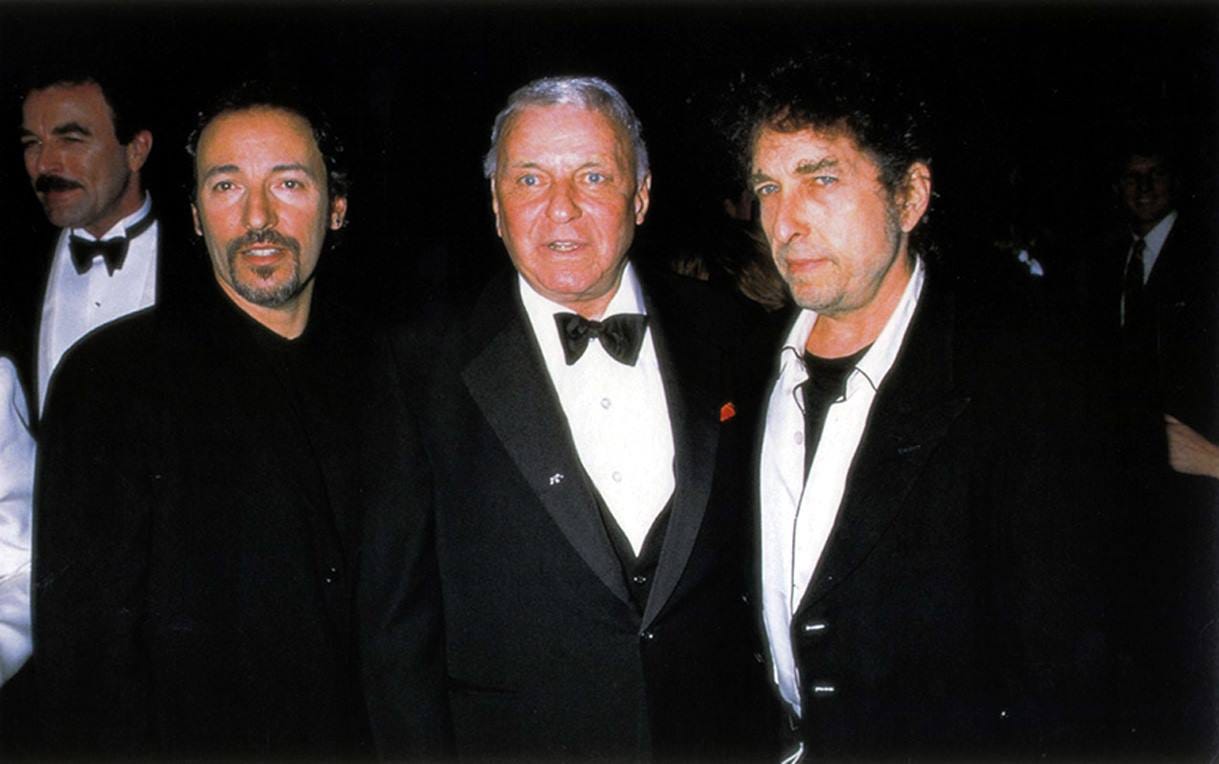
George Schlatter is a veteran of television production. He created Laugh-In in the ’60s, founded ABC’s American Comedy Awards in the ’80s, and produced decades of shows and specials for stars like Judy Garland, Richard Pryor, Cher, Muhammad Ali, and more.
One such special was done to celebrate the 80th birthday of Schlatter’s friend Frank Sinatra. It was taped 30 years ago today. Titled Sinatra: 80 Years My Way, it featured musicians like Ray Charles, Bruce Springsteen, Tony Bennett, Little Richard, and, of course, Bob Dylan. Most stars did Sinatra songs, but Dylan performed his own “Restless Farewell,” reportedly at Frank’s request.
I called up Schlatter a while back to talk about this special. Schlatter is now 95 years old and didn’t have a ton of Dylan-specific memories, but he had no shortage of stories from working with Sinatra for so many years. This conversation has been edited and condensed.
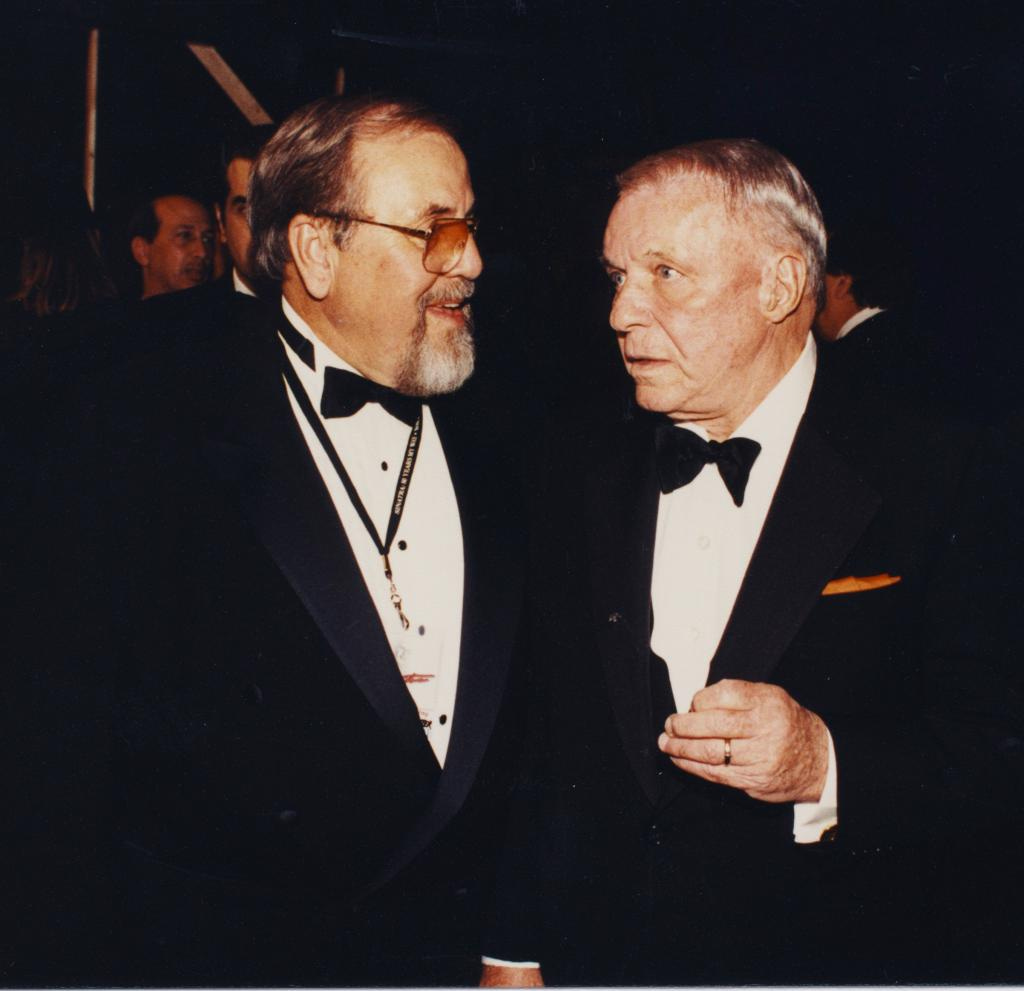
Before we get into that particular special, when was your first time working with Frank?
The first time I worked with him was terrifying. He walked into MCA [talent agency]. He was there to sign the contract. At that point, Sinatra never paid commission. They made so much money by representing Sinatra that he didn’t have to pay commission.
As he walked down the hall, all of the agents in the building followed him. He was so big, I expected him to be about eight feet tall, and he wasn’t; he was a small man. I was the only guy in the building in a gray gabardine suit. The rest of them were all black. He looked at me and he said, “I have ties older than this guy.”
You had done other television specials with him before this one in 1995 right?
Probably with him as a guest star, but the eightieth birthday was the big one. Everybody in the world wanted to be there.
Frank showed up an hour early. You can imagine what kind of tension that created. His wife Barbara called and said, “George, he just left the house.” I said, “Barbara, it’s five o’clock.” She said, “Yeah, he was nervous.”
You want to see something that’ll throw you off? Having all these people there getting in makeup and dressed, and have Sinatra, who the evening is all built around, walk in early. Everybody was off balance. He just walked in and said, “How late are you going to be, Crazy?” He called me Crazy. I said, “Well, Frank, we’re going to do this at seven thirty.” He said, “Let’s go now.”
Geez, can you imagine what that would be, with a whole cast and a crew and six cameras and an auditorium full of people and singers and musicians and orchestra?
So what did you do?
Well, fortunately I’d worked with him enough that, in the preparation of a Sinatra taping, you anticipated everything. He was totally unpredictable, in a predictable way. You knew he was going to do something. So what you did was you anticipated everything. You had to have plan A, B, C, and D and hope for the best.
He had a twinkle in his eye. He knew that he cast this umbrella of suspense and anticipation, and he enjoyed that. He was relaxed, but the world around him was tense.
Whether it was Steve and Eydie or Tony Bennett or Bono or any of those people, they had such reverence for Sinatra that it created an atmosphere of excitement and adventure. You cannot describe anybody today that could walk in the room and create that kind of electricity. You never knew what was going to happen with him.
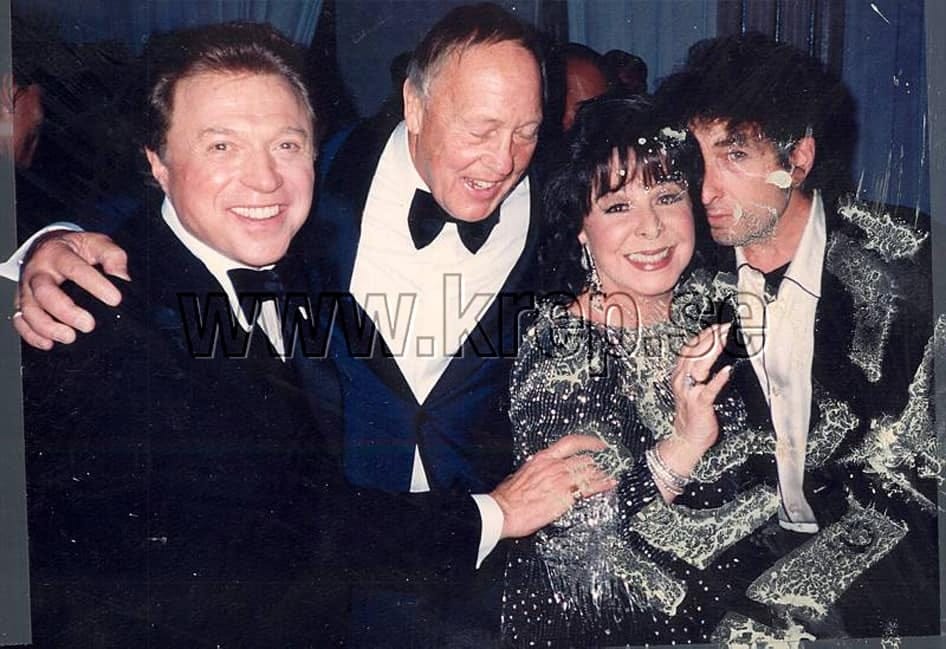
Where did the idea for the 80th birthday special come from?
I called him up and said, “Mr. Sinatra, it’s going to be your eightieth birthday and I would like to do a celebration.” And he said, “Why?”
Now, the secret with Sinatra was, make him laugh. I learned early on that if I could make him laugh, I could get away with anything. But you had to be careful. If he didn’t laugh, then you were in trouble.
He said, “Why?” And I for some reason said, “Because nobody thought you’d live this long.” He said, “Well, I fooled ‘em.”
So we went on and put together this special. Everybody we called said they would be there.
How did you decide which artists to ask?
You ask people that meant something to him, because he meant something to everybody. Like Steve and Eydie were part of his life, and Tony Bennett and Ray Charles and a lot of those people. And they all wanted to do it. It started out a one-hour show and it wound up like three hours. I sent it to the network and I said, “Here, you cut it.” They said, “We can’t cut it.” I said, “Good.”
Ray Charles showed up and did “Old Man River.” He said, “This song has been done by so many white people, I thought one time you ought to hear what it sounds like sung by a Black person.” For a Black man to be singing “Old Man River” to Sinatra, the anticipation of that was electric.
Rickles being there added some electricity to it as well, because everybody wondered what would Rickles say.
What did Rickles say?
He did what he always did. Rickles loved him and respected him, but said outrageous things to him. That’s one of the reasons Frank liked Rickles so much. Everybody else kind of backed off. They had such respect, admiration, and affection for Sinatra that they were careful. Rickles was not careful.
What about Bob Dylan? How did he get involved?
I think Dylan called and told us he wanted to do the show.
Dylan sang his own song. A song called “Restless Farewell,” not a Sinatra song, which was unusual that night.
Everybody wanted to do something that would get his attention. The shots of Frank listening to those lyrics are part of what made the show an adventure.
Can you take me through how the day went, other than Frank showing up two hours early?
As with everything involving Sinatra, you had to anticipate surprise. You had to anticipate it would not go normally. I think Stevie Wonder showed up with like a thirty-voice choir, which we had not anticipated. I said, “Stevie, I wish you could see what this looked like. We don’t have room for a thirty-voice choir.”
One time we did a thing for Sammy Davis, and everybody in the world wanted to do the show. They all arrived with entourages—twenty people, thirty people, drivers, bodyguards, whatever. Frank showed up with a suit. [laughs]
Did you see the show?
I just watched it on YouTube. I was only eight when it aired, so I missed it the first time.
When you watched the show, did you feel the electricity? Did you feel the hope and anticipation and danger that it generated?
I think Gregory Peck probably had the aura of superstar-to-superstar that generated a lot of excitement. We forget how big some of those people were, you know?
One thing I was surprised by watching it is the mix. You have these titans like Tony Bennett, Ray Charles, but you also have the current pop stars. Paula Abdul, Hootie and the Blowfish.
The secret was to put some people in there who you did not expect. Because you would expect Steve & Eydie and Ray Charles and Stevie Wonder, but you did not expect Hootie and the Blowfish.
One other performance I love is Bruce Springsteen’s.
When we announced we were going to do the show, a lot of those people called us and wanted to be on. And those audience shots are in themselves a bit awesome, because there were as many stars in the audience as we had on stage. We could have put that thing in the Coliseum.
Frank sat there and enjoyed it. He laughed when he was supposed to laugh. The only thing that was worrying us was if he was going to leave early. Because he had a minimal attention span. You had to find ways to hold his attention.
Do you remember any other stories related to Bob Dylan being there?
Bob Dylan brought a song we’d never heard of. Everybody was, “What’s Bob Dylan gonna do?” Because he was not a balladeer like Sinatra. He didn’t sing familiar songs, and he showed up with a song that nobody knew, but it was magic.
Again, do we have anybody today that has the aura of anticipation and suspense and danger and anxiety that some of those people did? Ray Charles and Bob Dylan and those people were not doing guest shots, you know? So when they arrived, it gave the feeling of an event.
As you say, Dylan is not someone who shows up to this sort of thing that often. I think it speaks to how he revered Frank that he did it.
That’s it. They all had such respect for Sinatra and affection. They were all kind of afraid of him a little bit. He wasn’t dangerous, but there was always the possibility he would screw us up. We were kind of ready for it.
After the show, everybody went over to Sinatra’s house. That caused a traffic jam in Beverly Hills not to be believed.
Yeah, I saw a nice photo of him with Barbara and Bob Dylan at his house.
I think the party went on until dawn. Frank never wanted to go to bed. So if you were going to Frank’s house, you knew you were going to be up late. I’d say, “Frank, I’m working tomorrow, I’ve got to leave now.” He’d said, “That does it, Crazy. I’ve gotta get younger friends.”
That also was the anticipation of a hangover because he never went to bed. He slept late, but he never went to bed. He loved Jack Daniels. I saw him drink, and I was aware of the fact he was drinking a lot, but I never saw him even partially drunk. So I don’t think he really swallowed as much as we thought he did. When you were with him, you did. That was the thing. He absolutely was obsessed with getting you loaded.
When he was in Vegas, the whole town lit up. One of the great events was when Sinatra, Sammy, and Dean played in Vegas. You couldn’t get near the hotel. Dean, who’d been a dealer and had huge hands, could do anything with cards. Between shows, they’d go out and play blackjack. Dean would deal cards you couldn’t believe. He said, “Twenty seven, that’s a winner!”
The owners of the hotel said, “You can’t do that. We’re giving away a lot of money.” I said, “Do you know how many people are in this town because he’s doing that?” Frank would say, “Deal it again.” “Thirty five, there’s a winner!” They drove the entire town crazy.
I had such fun with him. I’m sitting here looking at the office, and the office has all kinds of pictures of Sinatra. Every one of them brings back great, warm, wonderful, funny memories.
Why did he call you Crazy?
I just did funny things to him. I’d call him up on the phone and tell him, “Hey Frank, hold on a minute.” And I would get in my car and drive over to the house. While he was on the phone waiting for me, I’d walk in the front door. He thought that was funny.
He was such a star and such a monument as far as a singer is concerned. Then as far as the person is concerned, nobody ever sent a request to Sinatra for a donation that didn’t get a check. So we tried to keep all of those requests away from him, because anybody that asked for money, he would send him a check. He contributed more money to more charities than any other personality that I knew. He just could never say no.
Did you remember if you had any interaction with Bob Dylan yourself at that event?
No. Bob Dylan was not a great communicator. Just that he was there and wanted to sing a song I never heard of, but to have him there. He showed up because of Frank. Frank appreciated the fact that it was a rare appearance.
Frank liked Bob Dylan. Frank liked performers that were respectful, but also unusual. He related to them.
I look back at my relationship with Sinatra as a treasured, treasured collection of experiences. Because every time I was with him, professionally or socially, it was an adventure.
Thanks George! Buy his book ‘Still Laughing: A Life in Comedy’ at Unnamed Press or any bookseller. Here are some other performances on the program (I love the Little Richard one):
PS. Nothing to do with Dylan, but how can I not include the photo of Barbara Bush giving Schlatter bunny years while Sinatra tries to intervene:
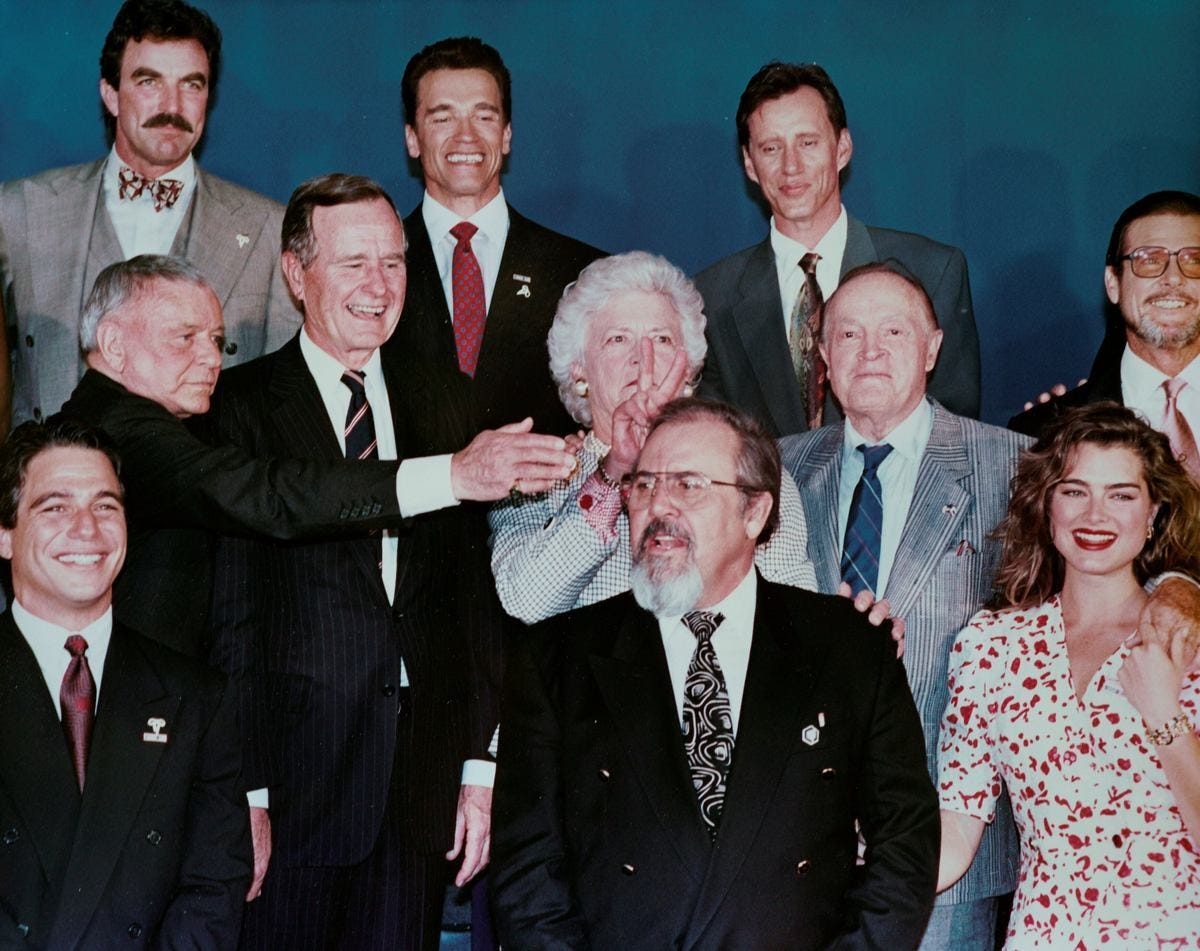

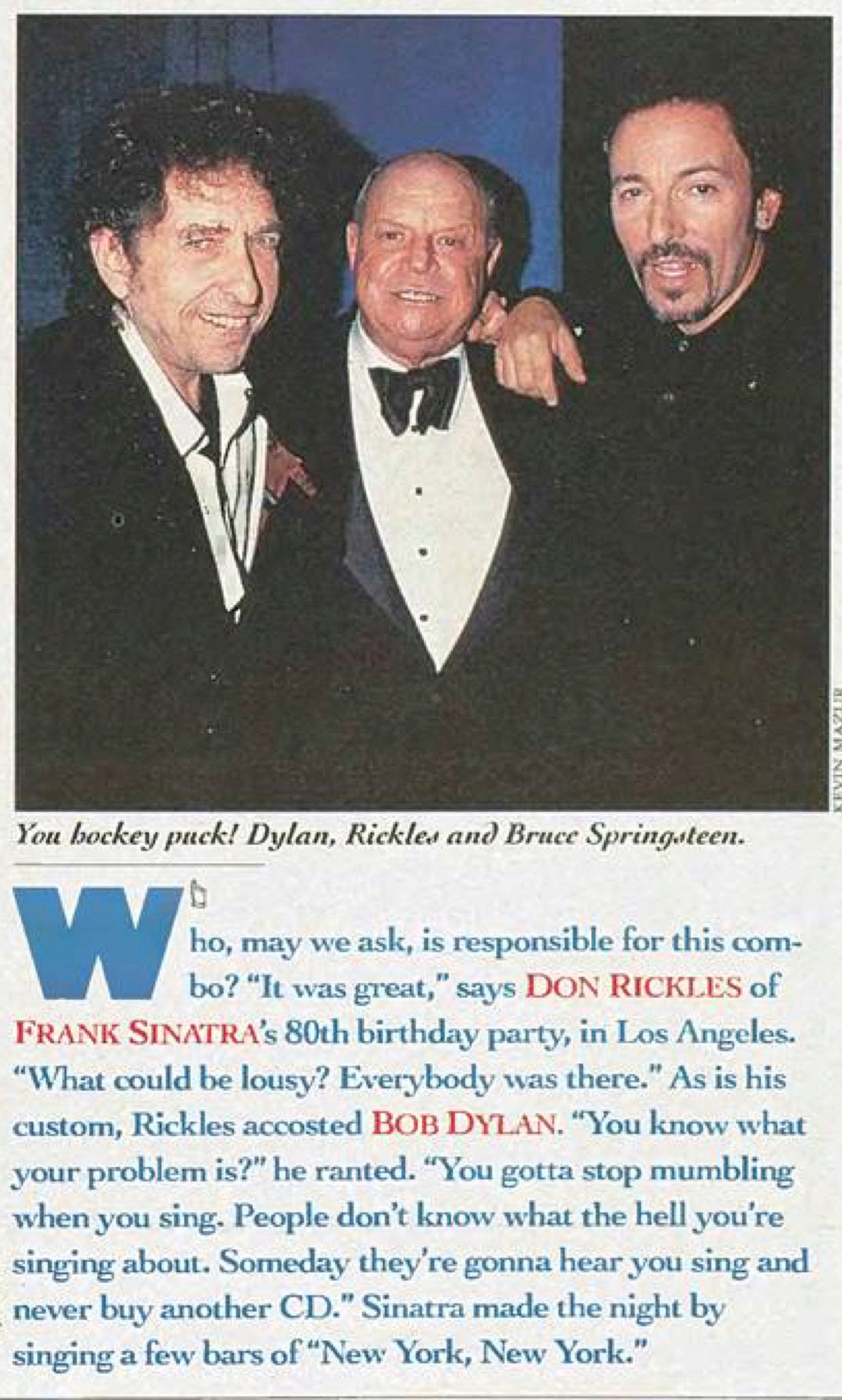
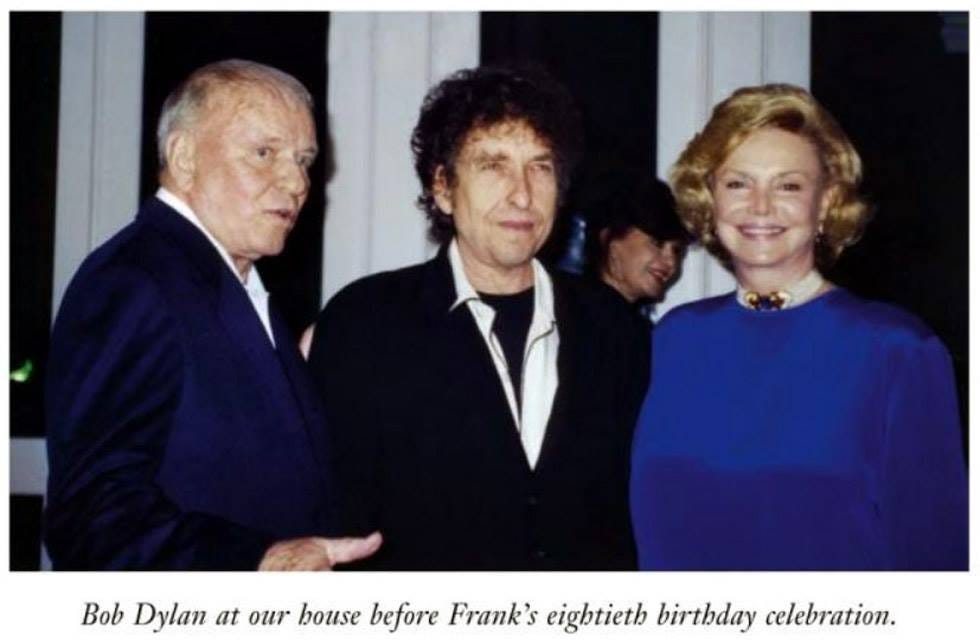
“He [Frank Sinatra] was funny. We were standing out on his patio at night and he said to me, ‘You and me, pal, we got blue eyes, we’re from up there,’ and he pointed to the stars. ‘These other bums are from down here.’ I remember thinking that he might be right.”
— Bob Dylan, in an interview with Bill Flanagan, posted atbobdylan.com, March 22, 2017
I always found it hard to believe that Sinatra requested Restless Farewell and this only makes me doubt it more. The only source of this claim is Dylan himself and we all know how reliable he is. Frank's facial expression was transfixed but puzzled. That said, the song choice was absolutely perfect and was played by Dylan and the band with unusual precision and dynamics for Dylan at that time. One of his all-time top performances.